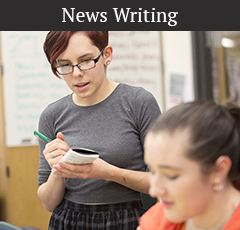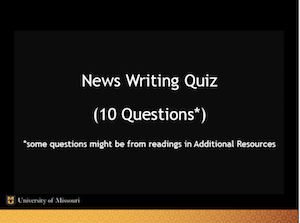News Writing Training
About this Lesson

Associate Professor.
Print and Digital Journalism.
Missouri School of Journalism.
University of Missouri
Reporting and writing the news is a means of telling members of the public what happened when they were not around to witness it. Everyone sees just a small slice of life in a given place each day, and the journalist’s job is to summarize the rest of the news that takes place in communities all around the world. A journalist will first collect the information carefully, accurately and fairly, then use this information to write stories that are easily understood by the audience. To do this, a journalist will often rely on a format called the inverted pyramid, which has proved to be a successful way to communicate news. The inverted pyramid puts the most newsworthy information first, starting with a “lede.” The rest is then arranged in descending order of importance. Learning this method allows journalists to work quickly and efficiently.
What you will learn
After completing this unit, you should be able to:
• Identify the characteristics of the inverted pyramid for presenting news
• Identify the key facts of a news story — who, what, where, when, why and how — for a lede
• Apply inverted pyramid method to write a news story
• Learn the purpose of quotes and source attribution
• Identify alternative ledes and when they are best used
How the lesson works
First of all, this is an asynchronous lesson unit, which means no live events are scheduled for this lesson. You can complete learning activities at your own pace whenever is convenient for you. Despite the asynchronous nature, the learning tasks are organized to help you succeed.
To be successful in this unit, please complete the following tasks:
• Watch the lecture.
• Take the quiz to test your own understanding. This will help you to strengthen the concepts you just learned.
• Optional: Due to the amount of content to be covered in a single unit, we encourage you read these additional resources. Some of the quiz questions might come from the readings in Additional Resources section.
Watch the Lecture
Click on the Launch button to start
Take the Quiz
Direction: Some of the questions might from the readings in Additional Resources below
Click on the Launch button to start
Lesson Resources
Lecture Script: Download it here
Printable Quiz: News Writing
ASNE Classroom Resources
Additional Resources
Tony Rogers, About.com: “How to write a great lede for your news story”
Tony Rogers, About.com: “When writing news stories, forget about chronology”
Tony Rogers, About.com: “Five tips for writing news ledes that are not too long, not too short”
Tony Rogers, About.com: “Writers talk about those ledes that come in a flash of inspiration”
Roy Peter Clark, Poynter: “Tips for writing more effective leads”
Kristen Hare, Poynter: “Gallery of good ledes, recommendation edition”
Karl Stolley, Allen Brizee, Joshua M. Paiz, Purdue Online Writing Lab, “Safe Practices”




